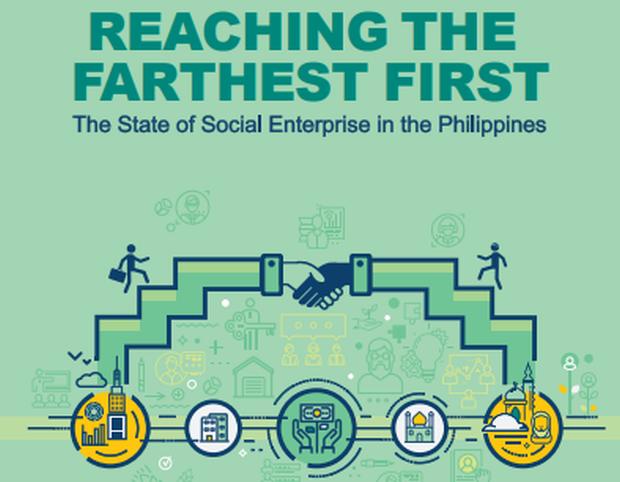Study: Getting capital is biggest barrier to growth of PH social enterprises

Part of the cover of the study, which is freely available online
More than half of social enterprises in the country – or organizations that aim to make profit out of addressing social problems – struggle to grow because of difficulties in obtaining capital.
These is one of the findings of a study – “Reaching the Farthest First: The State of Social Enterprise in the Philippines” – which was published last Oct. 26 by the British Council, the European Union, and the United Nations Economic and Social Commission in Asia and the Pacific (Escap).
The publication surveyed 206 social enterprises all over the country in an effort to to paint a picture of that sector, whose objectives include improving local communities and empowering marginalized groups while gaining profit.
The study estimates that that there are 164,473 social enterprises in the Philippines, which have grown in number in the past decade compared to the last four decades prior.
The agriculture sector accounts for most of social enterprises, or 19 percent.
“A rapid assessment of the data would show that the nature of the most pressing issues for social enterprises in the Philippines are financial or monetary. This is followed by human resource concerns,” a copy of the study, which is freely available online, read.
As to what constituted a “substantial barrier to growth,” 53 percent of the social enterprises said it was obtaining capital, 46 percent said it was grant funding, while 32 percent said it was cash flow.
This may pose a challenge for social enterprises, whose most common source of funding has been donation in either cash or kind, if not both.
Of the respondents, 68 percent said they aimed to pursue profit and social or environmental impact jointly, while the remaining 32 percent prioritized impact over profit.
Despite their struggle of these enterprises, the study insists that the sector still leaves a “significant” impact on society, creating over 17,000 jobs in 2016 and generating an approximate of at least $21 million in net sales.
Moreover, these enterprises plan to grow next year, 62 percent of which aim to do so by attracting new customers and clients. Likewise, 62 percent also said they plan to develop and launch new products, which the study said is a “commitment to innovation.”
“Despite their reported progress and optimism, Filipino social enterprises still face significant barriers to growth – the main barrier being lack of access to financing,” the study read.
“In addition to the social enterprise sector’s already developing support environment, there is a need for increased government and private sector in their growth and development,” the study said, adding that there are yet to be any direct policy for social enterprises in the country.
The study said that social enterprises can serve as the “missing link” in underdeveloped communities, “ensuring that even those hardest-to-reach are able to benefit from the gains of the Philippines’s globalising and emerging economy.”
The publication is an undertaking under a project jointly funded by EU and the British Council – “Strengthening Civil Society Participation in Social Enterprise Education and Development (CSO-SEED).”
The project aims to measure the current size and scale of social enterprises in the Philippines.
The EU has been a subject of several verbal attacks from the Duterte administration, which threatened in recent statements to cut even the development aid that the bloc gives to the country, most of which go to Mindanao.
While CSO-SEED is focused only in the Autonomous Region in Muslim Mindanao (ARMM), the publication serves as an “important baseline reference” for the project. /atm














